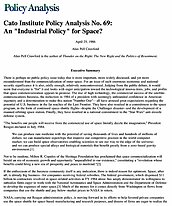“The benefits our people will receive from the commercial use of space literally dazzle the imagination,” President Reagan declared in July 1984.
An “Industrial Policy” for Space?
There is perhaps no public policy issue today that is more important, more widely discussed, and yet more misunderstood than the commercialization of outer space. For an issue of such enormous economic and national-security significance it is also, oddly enough, relatively noncontroversial. Judging from the public debate, it would seem that everyone is “for” it and looks with eager anticipation toward the technological innova-tions, jobs, and profits that space commercialization appears to promise. The rise of high technology, the commercial success of the satellite-communications business, the reelection in 1984 of a president with seemingly unbounded confidence in American ingenuity and a determination to make this nation “Number One”– all have aroused great expectations regarding the potential of U.S. business in the far reaches of the Last Frontier. They have also resulted in a commitment to the space program, in the form of continued space-shuttle flights–despite the Challenger disaster–and the development of a manned orbiting space station. Finally, they have resulted in a national commitment to the “Star Wars” anti-missile defense system.
We can produce rare medicine with the potential of saving thousands of lives and hundreds of millions of dollars; we can manufacture superchips that improve our competitive position in the world computer market; we can build space observatories enabling scientists to see our way to the edge of the universe; and we can produce special alloys and biological materials that benefit greatly from a zero-based gravity environment.[1]
Not to be outdone, Milton R. Copulos of the Heritage Foundation has proclaimed that space commercialization will herald an era of economic growth and opportunity “unparalleled in our existence,” constituting a “revolution whose benefits could bring a new era of prosperity and peace to mankind.”[2]
If the enthusiasm of the business community itself is any indication, there is indeed reason for optimism. Space, after all, is already big business–for companies receiving federal subsidies. The federal government, which dispensed $11 billion to contractors involved in space-related activities in FY 1984 alone, has amply demonstrated its willingness to subsidize firms eager to work with the National Aeronautics and Space Administration and the Department of Defense to develop the expanses of outer space.[3] Much of the money for it comes directly from Washington or flows from companies that use the shuttle and pay below-market prices to NASA in return.
NASA, carrying out Reagan administration policy, is moving forward in its efforts to help favored private companies use the space shuttle for space-based manufacturing and research purposes, and dozens of firms are eager to realize the profits to be made in private rocket-launch services. Satellite communications, an industry brought into existence by federal subsidy, generates $3 billion a year. Remote sensing (the use of satellites to detect conditions on earth) and materials processing (in which drugs, alloys, and crystals are produced in weightlessness) will soon become moneymakers themselves. Moreover, construction of the “infrastructure” of space–outer-space industrial parks with energy-generating plants, inventories of spare parts, launch systems, and the like–also represents an enormous commercial undertaking.
Space commercialization, in other words, is a reality. Even so, countless questions regarding the nature of its development–especially whether it should be directed by the federal government or by the private sector–remain unanswered. As will be shown, the intellectual and public policy environment in which these questions will be decided is not, at this time, a promising one for making progress toward a free market in space. Of the policy recommendations under consideration, almost all would strengthen the federal government’s domination of space commercialization. Federal control represents a serious obstacle to true commercialization, if by that one means a business environment in which the forces of the market, not the whims of the federal government, dominate. Complicating the picture still further, patterns of government policy inimical to a private-sector space industry are already in place, and their removal is almost invariably opposed by the most articulate proponents of the development of space as a center for commercial activity.
About the Author

This work is licensed under a Creative Commons Attribution-NonCommercial-ShareAlike 4.0 International License.
